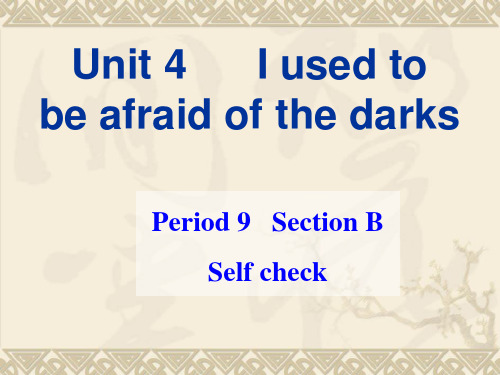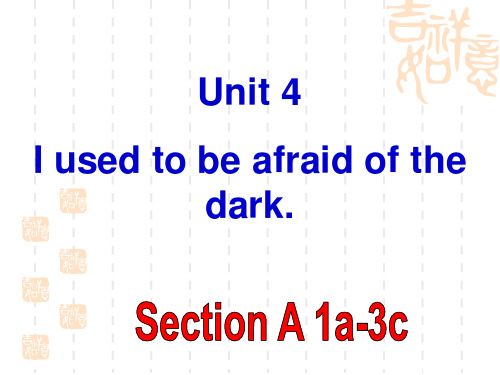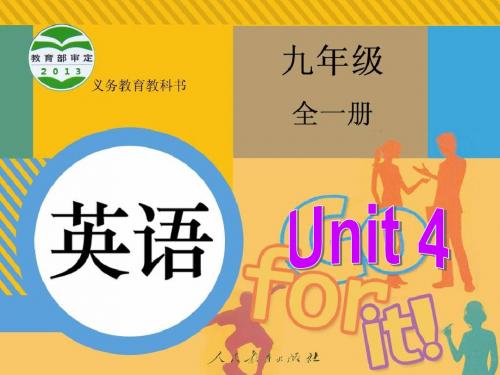2014年秋新目标英语九年级课件:Unit 4 I used to be afraid of the dark Section A(3a—4c)
合集下载
2014新目标九年级unit4_I used to be afraid of the darks 课件Section A 2d

的变化
朗读、描述Paula的变化
Paula
is my friend. She is a good girl.
Describe the changes of these people.
Read 2d
• This party is such a great idea! • I agree. It’s been three years since we last saw our primary school classmates. • It’s interesting to see how people have changed. • Billy has changed so much! He used to be so shy and quiet. • Yeah, his face always turned red when he talked to girls!
10.
Practice
(2009四川南充) There are two libraries in this city, _______? A. aren’t there B. aren’t they C. are two 14. (2009山东威海) Mom, my grandfather goes for a walk after supper every day, _______? A. does he B. is he C. doesn’t he D. isn’t he
He used to be shy, quiet and thin.
Fill in the blanks
It’s intresting to See Bill’s Personality
Appearance Everyday actions Talk to girls
2014新目标九年级unit4_I used to be afraid of the darks 课件Section B Self check

重点词汇复习:
humorous adj. 有幽默感的;图 2. silent adj. 沉默的; 3. helpful adj. 有用的,有帮助的: 4. score n&v. 得分,进球。 5. interview v&n. 面试,采访; 6. dare v. 敢于;胆敢; 7. private adj. 私人的,私密的。 8. require v. 需要;要求; 9. European adj. 欧洲的; 10. British adj. 英国的;
6.Kate‟s grandparents have had a great _______ on her. influence humorous 7.That British teacher is very _______. He always tells us interesting jokes. 8.People are usually required _____ to give a general self-introduction in a jobinterview _____. 9.Tina played very well in the basketball game and her parentstook _____pride in her.
Unit 4 I used to be afraid of the darks
Period 9 Section B Self check
Teaching aims
复习本单元词汇、短语、句型;
掌握本单元词汇、短语、句型;
自我反省,找出变化,力求自己更
好。
New words
general (a.n.) 普通的、普遍的,将军 in general---generally speaking 总的来说、总体上讲 introduction (n.) 介绍 introduce (v.) 介绍
2014年版新目标英语九年级Unit+4全单元课件

Look at the pictures and describe the people. What does he/she look like?
short/ brown hair 短/黄头发
long /black hair 长/黑头发
What does he/she look like?
curly hair 卷发
本句是一个反义疑问句,反义疑问句的特点 是“前否后肯”或“前肯后否”,而且后半句在时 态、人称和数等方面必须与前半句保持一致。 ► You are a doctor, aren’t you?
你是个医生,是吗? ► we can’t take books out, are we?
我们不能把书带出去,对吗?
He/She used to be/have/wear…, but now he/she is/has/wears ….
short/tall young/old heavy/thin
VS
He was shy when he was a child, but he is really smart now. He used to be shy but now he is really smart.
1.Mario used to be__sh__o_rt_ . He used to 2. weagrl_a_s_se_s___. 2. Amy used to be__t_a_ll____. She used to
have _s_h_o_r_t__hair. 3. Tina used to have__r_e_d_ and__c_u_r_l_y hair.
a ________ team.
outgoing
swim
2014_新目标_九年级英语_unit_4_I_used_to_be_afraid_of_the_dark_Section_A全课件

He _______ listen to pop music, but now he _______ dancing. A. is used to; used to B. use to; is used to C. used to; is used to D. used to; used to
【点拨】选C。句意:他过去常听流行音乐, 但现在他习惯于跳舞。
• I was shy.
Personality
I used to be…
= I used to be shy.
• She was friendly. = She used to be friendly. • He was funny. = He used to be funny.
VS
She liked reading when she was a student, but she likes singing now.
VS
He was ugly when he was a student, but he is really handsome now.
He used to be ugly, but now he is really handsome.
VS
He was naughty when he was a child, but he is really cool now.
2. What’s he like now? What’s he like?相当于What does he look like?,意思是“他长什么样?” --- What’s he like? --- He is tall and thin.
知识链接
What’s ... like ? 还可以用来询问“某事、某 物或者某人怎么样?” What’s Spring like in your hometown?
2014新目标九年级unit4_I used to be afraid of the darks 课件Section B 3a-3c

7.
I used to be afraid of dark. 我过去害怕黑暗。
8.
I’m terrified of the snakes. 我害怕蛇。
—Did you use to be afraid of being alone? 你过去害怕独自一人呆着吗? —Yes, I did. 是的,我怕。
3a 写作实践
内容提示: Talk with a partner about the changes that have happened to you. Write notes about how you have changed for these three things.
Appearance Personality
6、【2010江西· 南昌】29.一Are
B the dark? you ____ —Oh.yes.I always go to sleep with the light on. A.used to B.afraid of C.interested in D.good with
7、【2010· 兰州】We
Please tell us what things you used to like doing when you were a child.
play with my friends When I was a child, I used to like playing with my friends.
have D up early in order to catch the early bus. A. used to get B. been used to get C. used for getting D. been used to getting
2014秋人教版新目标英语九年级Unit 4 I_used_to_be_afraid_of_the_dark Section A 1a-2c

friendly友好的
serious严肃的
funny 有趣的
what else??
Look at the pictures and guess personality
Serious Funny Smart Friendly Shy Unfriendly
tall medium height big eyes straight hair
She has long hair now.
Did Tina use to have red hair?
Yes, she did. She used to have red and curly hair.
What’s she like now?
She has straight and blonde hair now.
Unit 4
I used to be afraid of the dark Section A 1a-2c
What does he/she look like? He/She is---
tall
short
medium height
What does she look like? She is/has---
Yes, he did.
Past
Doggy
Now
He ___________ used to play football, now he _____basketball. plays He used to play basketball, didn’t he? No, he didn’t.
Bob hasn’t seen his friends for four years. What
2a
Listen and check (√) the words you hear.
2014秋人教版新目标英语九年级Unit 4 I_used_to_be_afraid_of_the_dark Section A 1a-2c

. I used to be afraid of the dark. used to do sth. 过去常常做某事 表示过去经常性或习惯性的动作 或状态,暗指现在已经不存了, 强调过去与现在的对比。 used to的否定形式有两种:didn’t use to或usedn’t to。
used to用于疑问句时,可借助助动词 did,也可以将used提到主语前。 e.g. They used to be good friends. 他们过去是好朋友。 (暗示现在不是了) Mrs Brown didn’t use to / usedn’t to travel in summer. 布朗夫人过去夏天不旅游。 Did you use to / Used you to play the guitar? 他过去弹吉他吗?
2a
Listen and check (√) the words you hear.
___ outgoing ___ humorous ___ active ___ quiet
___ friendly ___ serious ___ silent ___ brave ___ helpful
2b Listen again and complete the
Listen again and answer the questions.
1. What class were they? They were in science class. ________________________________ 2. What was Paula never brave to do in class? ________________________________ She was never brave to ask questions ________________________________ to teachers.
最新人教新目标九年级英语全册 Unit 4 I used to be afraid of the darks课件

根据所给汉语提示完成英语句子。 1. My uncle _u__se_d__to__b_e_a__d_r_iv_e_r__(以前是个司
机), but now he is an actor. 2. Tom’s father __u_s_e_d_t_o_r_e_a_d__(b_o_o__k_s)__(过去
Unit 4 I used to be afraid of the darks
Section A Useful expressions
used to be/ do 过去是;曾经是/ 过去常 常做某事,表示过去经常性或习惯性的动作 或状态,暗指现在已经不存了。
there e like ?
quiet 文静的
shy 怕羞的
outgoing 外向的/好交际的
outgoing /quiet / shy /silent serious / funny friendly /kind smart /cute /lovely humorous active brave helpful
now she has many friends.
A. be B. having C. has D. have
根据要求完成句子,每空一词。
1. I used to be shy and quiet. (改为一般疑问句) _D_i_d_ you _u_s_e__ to be shy and quiet?
use ... to do sth. 用……做…… e.g. They use the knife to cut meat.
他们用刀切肉。 be used to do sth. 被用来做某事
e.g. This kind of wood is used to makepaper.
- 1、下载文档前请自行甄别文档内容的完整性,平台不提供额外的编辑、内容补充、找答案等附加服务。
- 2、"仅部分预览"的文档,不可在线预览部分如存在完整性等问题,可反馈申请退款(可完整预览的文档不适用该条件!)。
- 3、如文档侵犯您的权益,请联系客服反馈,我们会尽快为您处理(人工客服工作时间:9:00-18:30)。
*Jack gave an interview on TV last night.
杰克昨晚在电视上接受了采访。 *The interviewer is from CCTV. 采访者来自中国中央电视台。
【自主归纳】
interview的用法
(1)作为动词, 意为“面试; 会见; 面谈, 面试; 采访”。
Unit 4
I used to be afraid of the dark.
Section A(3a—4c)
Ⅰ. 单词填写 1. interview(v. ) ______________
2. dare(v. )
3. private(adj. ) 4. guard(n. ) 5. require(v. ) 6. public(n. ) 答案: 1. 采访; 面试 5. 需要; 要求 6. 民众
答案: 1. deal with 4. 许多 5. 继续奋斗
______________
2. in public 6. 做演讲 3. 从事歌唱事业
Ⅲ. 句型填词
1. 她过去很害羞, (所以)开始从事歌唱事业来应对她害羞的毛
病。 S h e _ _ _ _ _ _ _ _ _ _ _ _ _ _ _ _ _ _ _ _ _ _ _ _ _ _ _ _ _ _ re a l l y s h y
Ⅱ. 短语互译
1. 对付; 应付 2. 公开地 ______________ ______________
3. take up singing
4. tons of 5. fight on
______________
______________ ______________
6. give a speech
and__________ __________ singing to deal with her shyness.
2. 我过去在学校里不受欢迎, 但是现在我无论到哪里都会引起 很多人的注意。 I__________ __________ __________ be popular in school, but now I get tons of attention__________ I go. 答案: 1. used to be; took up 2. didn’t use to; everywhere
You used to be short, didn’t you? _____________________________ _____________________________ 答案: 该句为反意疑问句。其简短问句可以是didn’t, 也可以
是usedn’t。
1. interview v. 采访; 面试 【语境领悟】
(3)interviewer为名词, 意为“面试者; 会见者; 采访者”。
【学以致用】 ①我想采访那位著名的歌手。
I want__________ __________ the famous singer.
②Do you know who the__________ (interview)is? 答案: ①to interview ②interviewer
2. dare v. 敢于; 胆敢 【语境领悟】 *As she got better, she dared to sing in front of her class. 当情况有所好转的时候, 她敢在班里的同学面前唱歌。 *She doesn’t dare (to)meet her teacher’s eyes. 她不敢与老师对视。 *How dare she do things like that to me? 她怎么敢对我做那种事?
3. 我必须一直关注我给别人留下的印象, 我必须非常小心我的
所说所做。 I always have to worry about__________ I appear__________ __________ , and I have to be very careful about__________ I say or do. 4. 你不能够想象通往成功的路有多难。 You can never ima g ine___ ___ __ __ __ __ __ ___ _ the road__________ success is. 答案: 3. how; to others; what 4. how difficult; to
→__________ (adj. )亚洲的 →__________ (n. )害羞; 腼腆 →__________ (adj. )欧洲的 →__________ (adj. )非洲的 →__________ (n. )讲话; 发言 8. shyness 9. European 11. speech
______________
______________ ______________ ______________ ______________ 2. 敢于; 胆敢 3. 私人的 4. 警卫; 看守
7. Asia(n. ) 8. shy(adj. ) 9. Europe(n. ) 10. Africa(n. ) 11. speak(v. ) 答案: 7. Asian 10. African
*Dare you catch the mouse? 你敢去抓那只老鼠吗?
【自主归纳】
dare的用法
(1)dare用作实义动词, 此时其后的动词不定式可带 to也可不带
to, 且dare有人称和数以及时态的变化。
n. 面试; 访谈
*For this month’s Young World magazine, I interviewed
19-year-old Asian pop star Candy Wang. 为了给这个月的《青 年世界》杂志撰稿, 我采访了19岁的亚洲流行歌手王坎迪。
*Your interview for the job is tomorrow. 你的求职面试定在明天。
